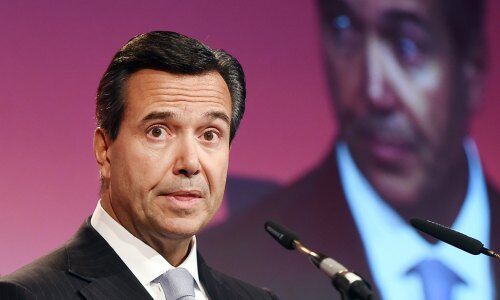At Credit Suisse, António Horta-Osório can fill Urs Rohner's shoes handily. The Swiss bank is getting a fierce proponent of technology and of workplace diversity – and its first-ever foreign chairman as it patches up its reputation at home.
Urs Rohner was always controversial since taking over at Switzerland's second-largest and -most important bank: the 60-year-old former television executive was needled early on for being a dogged trial lawyer, and not a career banker.
The initial criticism of Rohner, who understudied for two years before taking over, gave way to a more nuanced view: that he wasn't the visible figurehead, especially domestically, that Credit Suisse needed, given an American CEO (Brady Dougan) and later a French-Ivorian one (Tidjane Thiam), and that he doesn't have the ability to think in big strategic visions.
Polar Opposites
The opprobrium may be in part due to Rohner's nature, which rarely afforded glimpses of authenticity and is dominated by a Teflon-like ability to deflect criticism. Memorable examples are his 2014 insistence that «my vest is clean» after the bank was done for $2.5 billion and pleaded guilty in the U.S. over helping tax cheats, 2017's salary showdown, or most recently the spygate scandal.
António Horta-Osório, who is up to replace Rohner in six months, is the polar opposite in most of these points: a proven banker, the 56-year-old Portuguese native is a doer. He led Lloyds back to profitability following the harrowing 2008/09 crisis, including through three grueling restructurings.
Cutting It Fine
Rohner, who spearheaded the search to replace himself and had toyed with the idea of staying on, is cutting it fine: Horta-Osório will parachute in at the Swiss wealth manager at the same time as he is due to take over as chair. A spokesman for Lloyds clarified that Horta-Osório will remain with the British bank until April 30.
As Horta-Osório transitions from being a CEO to an overseer, his start in Switzerland is likely to be less tumultuous than when he was started running Lloyds. In 2011, just eight months into the job, he checked himself into the Priory, a pricey clinic popular with the jet set for addiction and mental health issues.
Horta-Osório, who is married and father of three, was suffering from burnout which began with sleep deprivation. His thoughts centered on the bank – at the time not out of the woods following the financial crisis and government bailout. «I thought I was Superman. I felt I could do everything.» The burnout «showed me I was not Superman,» he later related.
Huge Technology Spending
Once in Zurich, Horta-Osório is likely to put new emphasis and attention of Credit Suisse’s digital efforts, where a new hybrid push – CSX – launched last month. At Lloyds, he poured nearly one-fifth of spending into technology, according to trade publication «Tech HQ».
That is more than European or U.S. rivals and far exceeds that of UBS, which spent about $3.5 billion last year, or roughly ten percent. Credit Suisse doesn’t disclose what portion of spending it puts towards technology or wider innovation efforts
City's First Feminist
Horta-Osório is also likely to give a fillip to efforts to get more women as well as minorities into executive decision-making. He began talking about diversity – mainly about advancing women in top management – far before his peer group did, in 2014.
The issue needs attention at Credit Suisse, which has lost a series of high-profile female bankers including Christine Schmid, Saumya Bhavsar, Kathrin Wehrli, and Florence Schnydrig-Moser recently. While Credit Suisse has poured resources into getting women back into the workplace, it hasn’t signed on to an equal pay guideline (UBS won the certification in April). Both big Swiss banks are part of Bloomberg’s gender equality index.
Departure In Style
Horta-Osório handling of his missteps is also a marked contrast from Rohner: Horta-Osório's 2011 burnout represents a rare show of vulnerability from a hurly-burly City and Wall Street Culture. He became a vocal advocate for mental health issues in the workplace, and at Lloyds rolled out a program for 200 top bankers to learn about nutrition analysis, mindfulness, psychological testing and physiological testing and tools for cognitive behavioral therapy.
He also survived a 2016 scandal over an extramarital affair with radical transparency and an apology for damaging the bank's name – but not for the affair, which he called a private matter. Coupled with his efforts to route Lloyds back to profitability, Horta-Osório seems to qualify on hard as well as soft factors: a full-blooded banker and strategist who knows his worth, going by the persistent debate over his bonus payments at the British bank.
Potential Vulnerabilities
All the same, Horta-Osório represents a risk for Credit Suisse at home, where the bank likes flaunting its historical clout. Horta-Osório is unknown in the corridors of Bern, Basel, where a conflict among Swiss bankers has blown open, or Brussels.
His career was built in Portugal, New York, Brazil, and London – inevitably, some corners of Swiss banking will criticize that Horta-Osório isn't one of their own. The rough treatment of ex-Credit Suisse CEO Tidjane Thiam exemplifies how influential a local, politically-connected network still is.
The way Horta-Osório elects to work with CEO Thomas Gottstein, in the job just ten months but coming into his own in crisis, represents a further risk. Horta-Osório is transitioning – literally from one day to the next – from a CEO gig to chairman. It remains to be seen how well he can keep from swooping directly into daily business while providing much-needed impetus to matters dear to his heart, like technology.
Peter Hody contributed reporting




































